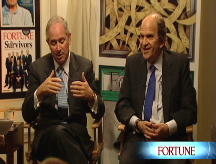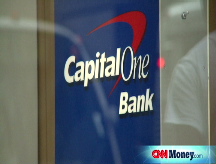Bailout? Some banks say, 'No thanks'
Cullen/Frost, a bank in San Antonio, announced it won't need government money. Other banks may follow suit to show how strong they are.

 |
| San Antonio-based Cullen/Frost Bankers said it doesn't need an investment from the government. And a quick look at how the stock has fared compared to the S&P Bank Index shows why. |
NEW YORK (CNNMoney.com) -- Not every U.S. financial company is running to the government for help.
Cullen/Frost Bankers, a San Antonio-based bank with $14.1 billion in assets, announced Friday that it has decided to not ask for funding through TARP, the Treasury Department's Troubled Assets Relief Program.
Since the TARP program was launched last month, dozens of banks have received approval for a government investment, and many more are expected to apply before the deadline on Nov. 14.
But it looks as if Cullen/Frost (CFR) really doesn't need the money. Earnings per share are expected to fall only about 3% for the full year, compared to expectations of a 67% drop in profits for the financial-services sector overall, according to data from Thomson Baseline. And Cullen/Frost's stock is actually up 13% this year, an astonishing feat in this market.
"Cullen/Frost is well capitalized now and for the foreseeable future, with sufficient capital to grow our business and take advantage of acquisition opportunities," said Dick Evans, Cullen/Frost's chairman and CEO in a statement.
What I find most interesting about Cullen/Frost's public spurning of TARP is that the bank appears to be trying to out-spin the Treasury Department and banks that have already announced they are receiving TARP money.
When Treasury Secretary Henry Paulson first announced that the government would invest up to $250 billion in banks, the pitch was that only the strongest banks would be able to get money.
In addition, executives of many banks are putting out press releases in which their CEOs declare how happy they are that the Treasury Department chose them.
But just check out the headline of Cullen/Frost's press release: "Cullen/Frost Will Not Apply for Federal Bailout Funds."
The bank seems to be saying that participation is hardly a sign of strength. That makes sense: If a bank is truly well-capitalized, why would it willingly agree to dilute its current shareholder base as well as to restrictions on executive compensation and dividends it can pay?
Cullen/Frost is not alone. First Citizens BancShares (FCNCA), a Raleigh, N.C.-based bank with $16.7 billion in assets, also said it is not interested in a Treasury investment. ""We are not taking TARP funding. Our capital ratios are excellent and we don't need a capital infusion," said a company spokesperson.
After the closing bell Monday, Kansas City-based UMB Financial (UMBF), also announced that it would not apply for funding from the government. The bank has been another one of the few to buck the downward trend this year: earnings per share are expected to increase 37% and the company's stock has risen 20%.
We'll probably see more such announcements. I would not be surprised, for example, if Hudson City Bancorp (HCBK), a bank based in Paramus, N.J., that we dubbed the anti-Countrywide in the summer of 2007 because of its conservative lending standards, decides it won't be applying for TARP funding.
Like Cullen/Frost, Wall Street has already recognized that Hudson City is among the best-managed: Shares are up 27.5% this year and earnings per share are expected to increase nearly 60% this year. A spokesperson for Hudson City did not have a comment about the bank's willingness to participate in TARP.
Some insurers are also taking issue with the idea that a government investment equals a vote of confidence.
Though several life insurers have indicated that they might consider taking part in TARP if eligible, executives of property and casualty insurers Travelers (TRV, Fortune 500) and Chubb (CB, Fortune 500) both released letters last week expressing their opposition to including insurers in TARP.
Travelers CEO Jay Fishman wrote that "private market solutions" should be sought for insurers facing a capital crunch. Chubb vice chairman and COO John J. Degnan wrote that Paulson needs to "consider the anti-competitive impact of bail-outs" in the insurance industry.
Along those lines, one lawyer who works closely with financial firms said that some banks that think they may not need TARP funding do need to think about the advantages that their peers may get from receiving a capital boost.
"If a lot of banks get TARP money, the banks that don't have TARP may have lower capital ratios compared to their peers and regulators and lenders do look closely at peer comparisons," said Chip MacDonald, a partner with the capital markets group at law firm Jones Day.
Still, I think that banks like Cullen/Frost that have decided they don't need Hank to help them out, should be applauded. Banks shouldn't be applying for TARP just because they can. They should do so only if they really need it.
"Some banks will have a hard time justifying what they would use the money for," MacDonald said. ![]()



